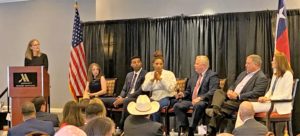On July 22, 2021, the West Houston Association (WHA) brought together Houston City Council members Amy Peck, Tiffany Thomas, Greg Travis, Edward Pollard, David Robinson, and Sallie Alcorn, for an in-person forum about issues facing the greater West Houston region. The council members engaged in a moderated discussion about the budget, crime, and the livable places initiative led by Marlene Gafrick, Vice-Chair of WHA’s Board of Directors. The panel provided an opportunity for council members to come together and have an open, honest conversation about the challenges that West Houston is facing and how we can come together to achieve our shared vision of a region where everyone has the opportunity for great experiences to live, work, and play.
 The conversation started off with each council member mentioning their top three issues and a repeated concern was infrastructure. Council Member Thomas said, “Under deferred maintenance, we have inherited a 75-million-dollar investment on public works facilities and now we are in a place where we get to innovate what we do with it.” Innovation and privatization provide potential opportunities to address budget management. Council Member Pollard said, “we need to understand that there are multiple ways the city can be creative to find money” and we need to look at this “in a holistic standpoint.”
The conversation started off with each council member mentioning their top three issues and a repeated concern was infrastructure. Council Member Thomas said, “Under deferred maintenance, we have inherited a 75-million-dollar investment on public works facilities and now we are in a place where we get to innovate what we do with it.” Innovation and privatization provide potential opportunities to address budget management. Council Member Pollard said, “we need to understand that there are multiple ways the city can be creative to find money” and we need to look at this “in a holistic standpoint.”
Houston is the only major city in Texas that does not charge a separate fee for garbage collection. The current solution is to start charging fees so that the City will have more funds to pay for waste collection and disposal. However, an alternative way, may be to consider privatization if it can be done at a lower cost. “We need to look into the privatization of solid waste,” said Council Member Robinson as he told the audience about his discussions with private sector companies who said they can do it cheaper that what it costs the city.
Crime has been on the rise in Houston, and the discussion at the event focused on bail reform regarding this issue. Council Member Travis, who had recently hosted a town hall on crime in District G, addressed the concept that “bad people need to be put in prisons and good people released.” Bail reform was brought up by Council Member Alcorn, saying “there are hundreds of thousands of cases backlogged for a myriad of reasons. We’ve got Covid-19, courthouses down, and Hurricane Harvey; the number of cases being tried decreased so nobody was going to court and everybody’s out.” Council Member Pollard agreed stating that “we have to nip it in the bud and it starts with the judges.”
When concluding about crime reform, Council Member Thomas said, “we need to stop looking at this issue and politicizing it. We are talking about people who are terrified to leave their homes.” That there need to be actions, accountability, and personal responsibility for the judges and better control over bail reform.

The main issue discussed about the Livable Places Initiative in the Planning Department was conservation districts. This will lead to adopted regulations covering massing; lot size and width; lot depth; front, side, and rear setbacks; height; and architectural styles. Council Members Robinson and Travis discussed that the Livable Places Initiative will bring about a drastic change to Houston— not necessarily for the better. With Council Member Robinson saying, “the problem with this initiative is that it looks too much like zoning… Houston is not a city that needs widespread land use controls or zoning.” Council Member Travis followed up by commenting that “we should not be trying to impose a one size fits all for Houston.” Houston is a diverse region and the implementation of the Livable Places Initiative may cause restriction rather than flourishment.
Overall, the panelists were optimistic about Houston’s future, recognizing that it will take them working together to bring continuous improvement to the region. Most of the council members stayed after the panel to talk with members and guests.
Thanks to Jada Oriahi, Emory University student, for her work on this summary.
